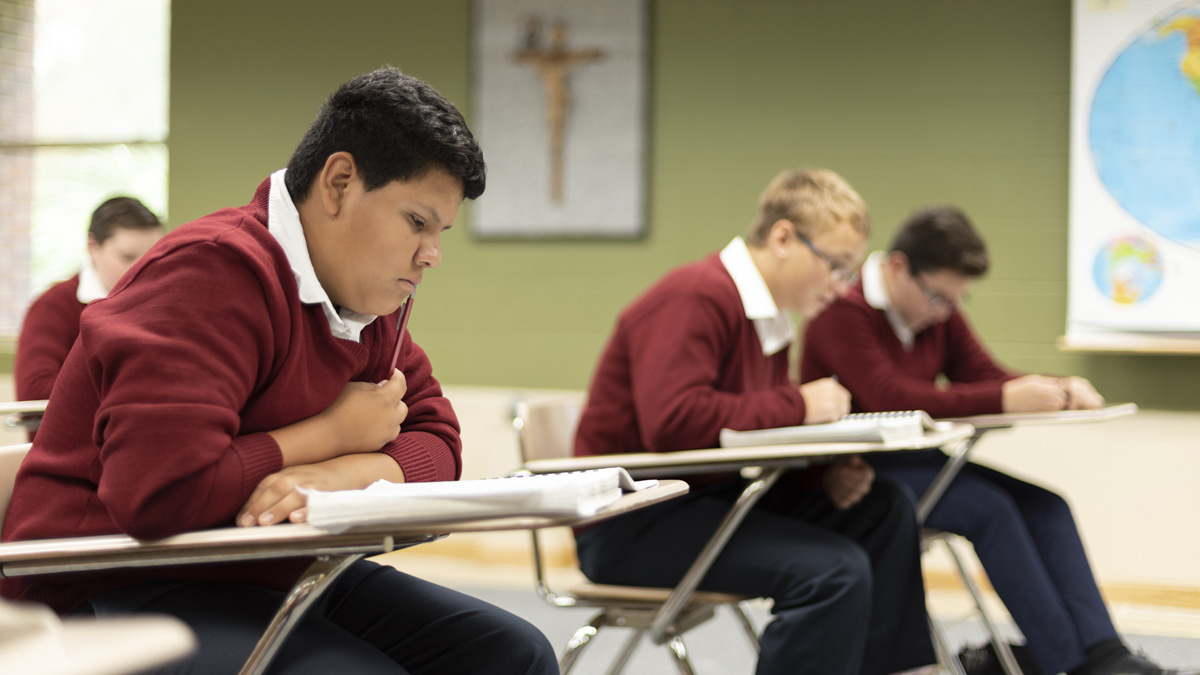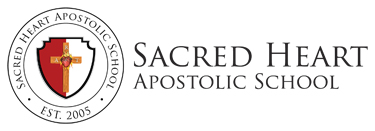
English
Grammar: Students review and deepen their understanding of topics previously covered, then study phrases, clauses, verbals, and language mechanics in greater depth.
Vocabulary: Each week, spelling, definition, and proper usage of twenty words are learned using Sadlier-Oxford’s Vocabulary Workshop, levels C and D.
Literature: Students read classic short stories, supplemented with poetry and famous speeches. The goal is for students to develop an appreciation for good literature and to begin to think deeply about what they read.
Composition: Students learn to write well-constructed analytical compositions; they also do various creative writing exercises.
Oral reading: Students read excerpts from literary works, memorize and recite poems, and deliver their own written work in front of the class. Students also memorize and perform one excerpt from a literary classic each year.
Algebra
This course covers content typical of an Algebra 1 class. After a brief review of important concepts such as the commutative, associative, and distributive properties, students practice solving algebraic equations and inequalities that are more complex than those covered in pre-algebra. In many cases students must form the equations and inequalities themselves from information given in word problems and then solve the problem. Students study powers, adding and multiplying polynomials, and factoring both regular and special case polynomials. Next, the course covers the use of the four basic operations with rational expressions and complex rational expressions. Students then study functions, equations with two variables, and graphing linear equations. The course finishes with analytic geometry, systems of linear equations, and radicals.
Science
This course deals with the study of the nature and properties of matter and energy. It begins with a definition of natural science and consideration of the best procedures for obtaining scientific knowledge. Next, the International System of Units is studied along with dimensional analysis. The majority of the class involves the study of chemistry. This includes such topics as the structure of matter and its various classifications, the periodic law and the periodic table, bonding and chemical reactions, solutions, and carbon chemistry. As time allows, nuclear chemistry will be covered. Labs and the application of learned principles to real life situations help students assimilate the diverse topics covered in the course.
World History I
Prehistory through the Roman Empire: The course begins by explaining what history is and how it differs from prehistory. Subsequent chapters deal with the major ancient civilizations: Sumerian, Egyptian, Babylonian, Persian, Hebrew, Indian (up through the Mauryan dynasty), Chinese (up through the Han dynasty), Greek, and Roman. Emphasis is placed on continuity of ideas, with later cultures building upon earlier ones.
Latin
Students begin using, Jenney’s First Year Latin text. Vocabulary, spelling, parts of speech, and subject-verb agreement are studied first. Short translations help the students recall what is learned in each lesson. Advanced grammar including the subjunctive mood and syntax is studied after an intensive review of the basics of Latin I. Translation can increase, using original texts such as the New Testament and works by Caesar and St. Augustine. All irregular verbs are covered in this level.
Religion
This class focuses on how we celebrate the Christian mysteries (the sacraments). We study how God acts through all the sacraments; what is the matter, form and minister of each sacrament; and the extension of the sacraments into our daily lives. In both semesters, comparison and contrast is made to current events and attitudes in our culture or throughout the world, which bear a relationship to what we are studying. Particular attention is given to our loving relationship to the Trinity: to God our Father, to His Son and our Savior, Jesus Christ, and to the Holy Spirit.
Computer Skills
This course focuses principally on essential keyboard skills and report layouts. The students learn typing during two periods each week using a professional typing tutor program.
Physical Education
Daily physical education is an essential part of the Sacred Heart Apostolic School program. We believe that sports provide not only the physical and mental rest necessary for the student’s balanced growth but also the opportunity to form character and virtue and to thoroughly enjoy one’s growing abilities. At least one hour a day is allotted for intramural soccer, basketball, hockey, football, volleyball, and other sports.
On alternating Saturdays, the students have a chance to enjoy nature off campus at local parks or work on the grounds around the campus.

